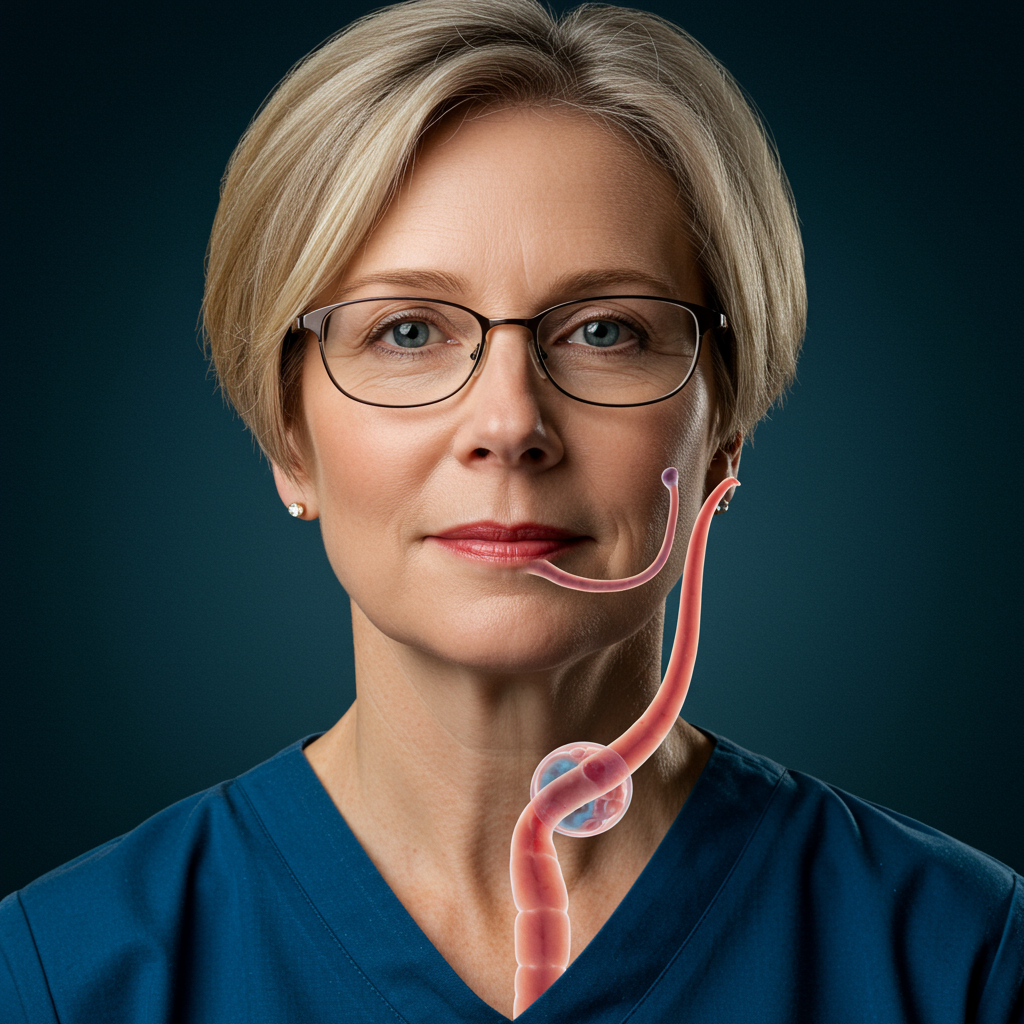Millions of people may be living with a hidden health risk that a leading gut specialist calls a “ticking timebomb.” While many associate acid reflux with simple heartburn, a significant number of individuals experience no typical symptoms, potentially missing a crucial warning sign for a deadly form of cancer.
Gastroenterologist Dr. Wendi LeBrett has highlighted the lesser-known danger of acid reflux: its potential link to oesophageal cancer. This aggressive disease affects the tube that carries food from your mouth to your stomach. It is notoriously difficult to detect early due to subtle symptoms, contributing to a grim prognosis where around 9 out of 10 patients sadly pass away within 10 years of diagnosis. Understanding the connection between common digestive discomfort and this serious illness is vital for timely intervention.
The Unexpected Link: Acid Reflux and Oesophageal Cancer
Acid reflux, also known as gastroesophageal reflux disease (GERD), occurs when stomach acid flows backward into the oesophagus. This acidic liquid is designed to break down food in the stomach, not to bathe the sensitive lining of the oesophagus. Repeated exposure to this harsh acid can cause inflammation and damage over time.
Persistent acid damage can lead to changes in the cells lining the oesophagus. This cellular transformation is a significant risk factor for developing cancer. The connection is well-established in medical science, underscoring the importance of managing even seemingly minor or infrequent reflux symptoms.
Beyond Heartburn: Recognizing ‘Silent’ Acid Reflux Symptoms
Dr. Wendi LeBrett points out a critical issue: many people with acid reflux don’t fit the classic picture. While approximately 60 to 70 percent of sufferers experience the well-known burning sensation in the chest, often after eating, a substantial portion – up to one-third – do not have typical heartburn symptoms. This makes ‘silent’ acid reflux a genuine concern, as individuals may be unaware they have the condition and are therefore exposed to the long-term risks without suspicion.
Recognizing these less obvious signs is key. Be vigilant for symptoms that might not immediately seem related to your stomach:
Chronic Cough: Especially one that worsens at night. Lying down can make it easier for stomach acid to travel up the oesophagus and irritate the airways, triggering coughing fits. [Link to Article on Chronic Cough]
Breathing Problems: Acid irritating the delicate tissues in your airways can exacerbate existing conditions like asthma or lead to new respiratory difficulties.
Difficulty Swallowing: While sometimes a direct symptom of inflammation or damage, problems swallowing can also be an atypical reflux sign.
Dental Issues: Acid reaching the mouth can erode tooth enamel. Dentists may spot signs like yellowing, increased sensitivity, or cracks in the teeth caused by acid damage.
These subtle indicators can easily be dismissed or attributed to other causes, allowing acid reflux to go undiagnosed and untreated for years.
The Progression: From Reflux to Barrett’s Oesophagus
Untreated, chronic acid reflux can sometimes lead to a more serious condition called Barrett’s oesophagus. This occurs when the normal cells lining the lower part of the oesophagus are replaced by cells similar to those found in the intestine. This change happens as the body attempts to protect itself from ongoing acid damage, but it unfortunately comes with a significantly increased risk of malignancy.
Barrett’s oesophagus is considered a pre-cancerous condition. While not all people with Barrett’s will develop cancer, it substantially raises the risk. According to Cancer Research UK (CRUK), estimates suggest that between 3 and 13 percent of individuals with Barrett’s oesophagus will go on to develop oesophageal cancer. This translates to an approximately 11-times greater risk of being diagnosed with the cancer compared to someone without Barrett’s. Identifying and monitoring Barrett’s oesophagus is a crucial step in cancer prevention, highlighting why managing the underlying acid reflux is so important.
Oesophageal Cancer in the UK: Alarming Statistics and Preventability
The statistics surrounding oesophageal cancer in the UK are concerning. The disease is on the rise, with overall cases increasing by 3 percent since the 1990s, and a more significant 10 percent rise specifically among men. The UK also has one of the highest rates of oesophageal cancer in Europe, claiming an average of 22 lives every single day. Data shows 14.2 new cases per 100,000 people per year in the UK, starkly higher than rates in countries like Italy (3.5), Spain (4.4), France (7), and Germany (7.7), and just slightly behind the Netherlands (14.9).
Despite these alarming figures, there is hope. CRUK estimates that around three in five (about 60 percent) of the nearly 9,500 cases diagnosed in Britain each year are preventable. While chronic acid reflux is a significant factor, other well-established risk factors also play a major role. Smoking is considered one of the largest contributors, linked to about one-third of cases. Persistent symptoms like a sore throat, particularly when swallowing, can also be a sign and should be investigated by a doctor if they don’t resolve quickly or worsen. [Link to Article on Smoking Cessation]
Taking Action: When to Seek Medical Advice
Given the potential risks and the prevalence of ‘silent’ symptoms, knowing when to seek professional medical help is paramount. Dr. LeBrett strongly advises anyone experiencing frequent symptoms, whether typical heartburn or the less common signs like chronic cough, breathing issues, swallowing problems, or even unexplained dental erosion, to consult a doctor.
Medical professionals can evaluate your symptoms, consider your risk factors, and determine the best course of action. This might involve recommending lifestyle modifications (such as dietary changes, weight management, or avoiding late-night meals), prescribing medication to reduce acid production, or suggesting further investigations like an endoscopy to examine the oesophagus directly and check for inflammation, damage, or conditions like Barrett’s. Early diagnosis and management of acid reflux, especially in preventing the progression to Barrett’s oesophagus, can significantly reduce the long-term risk of cancer. User experiences shared online underscore this urgency, with some reporting late diagnoses after years of dismissed symptoms, emphasizing the need for persistence and thorough evaluation.
Frequently Asked Questions
What exactly are the hidden or atypical symptoms of acid reflux that increase cancer risk?
Beyond the typical heartburn feeling, silent acid reflux can manifest as symptoms unrelated to the stomach. These include a chronic cough, especially noticeable at night, breathing difficulties that can worsen conditions like asthma, problems or difficulty swallowing, and signs of acid damage to teeth such as yellowing, cracks, or increased sensitivity visible during dental check-ups. Recognizing these unusual signs is crucial for timely diagnosis and managing potential cancer risk.
When should someone experiencing acid reflux symptoms seek medical help?
It’s advisable to consult a doctor if you experience acid reflux symptoms frequently, even if they are mild, or if you notice any of the ‘silent’ or atypical symptoms mentioned in the article, such as a chronic cough, breathing issues, difficulty swallowing, or unexplained dental problems. Seeking professional evaluation is especially important if symptoms persist, worsen, or significantly impact your quality of life, as early intervention can help manage the condition and reduce the risk of complications like Barrett’s oesophagus and cancer.
Can treating acid reflux prevent oesophageal cancer?
Effectively treating chronic acid reflux can significantly lower the risk of developing Barrett’s oesophagus and, subsequently, oesophageal cancer. While treatment doesn’t eliminate the risk entirely, particularly if Barrett’s has already developed, managing acid exposure helps prevent further cellular damage and reduces the likelihood of precancerous changes progressing. Doctors can recommend lifestyle changes, medication, and monitoring to help control reflux and mitigate long-term cancer risk.
Conclusion
The warning from gut health experts is clear: acid reflux is more than just an uncomfortable inconvenience for millions. It represents a significant, potentially hidden, risk factor for a serious and often deadly cancer. The key takeaway is the importance of awareness – not only of the classic heartburn symptom but also of the less obvious signs like chronic cough, breathing issues, or difficulty swallowing. Untreated reflux can lead to Barrett’s oesophagus, a precancerous condition that dramatically increases the likelihood of developing oesophageal cancer. With rising rates of this cancer in the UK and its high mortality rate, recognizing symptoms early and seeking prompt medical advice are critical steps in preventing a potentially devastating outcome. Don’t ignore persistent or unusual symptoms; consult your doctor to understand your risk and explore effective management strategies.




